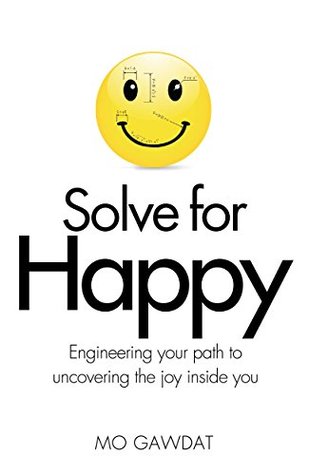More on this book
Community
Kindle Notes & Highlights
by
Mo Gawdat
Read between
April 29 - October 17, 2020
If you count each neuron as a small computer, your brain would have thirty times more neurons than the number of computers and devices that make up the entire Internet.
It might, for example, in a moment of huge emotional pain, make the seemingly logical decision to end your life by switching off your heart. Luckily, this feature is excluded from our design because thought does not always produce the best results.
Ego is not used here to mean arrogance but rather to mean a sense of identity, a persona—the way you see yourself and believe (or wish) that others see you.
Everything we earn from the persona is spent on maintaining it, but none of it makes us really happy. Yet, we never stop to reconsider what we do as long as it keeps our egos intact.
When they sit back down, the teacher acknowledges the most beautiful cups, but then points out that what they all really wanted was coffee. Regardless of the cup, the coffee was the same. If social status, fashion, image, possessions, and social acceptance are like the cup, he says, then life is the coffee. Why do we try so hard to drink from a fancy cup when all we want is good coffee? If you want to live a stress-free life, he says, ignore the cup and just: Enjoy the coffee.
Ego isn’t always about vanity. Often the images people build for themselves are negative. They believe deep inside that they’re worse than they really are.
Negative personas can be driven by feelings of diminished selfworth, self-pity, guilt, or shame. I’m fat. I’m ugly. I’m short. I’m stupid. I don’t deserve to be loved. I’m a sinner who deserves to be punished.
Specifically, I would remove our obsession with being “right.” I would erase the Illusion of Knowledge.
Nothing is good or bad, but thinking makes it so.”
If you’re not in the here and now, then you’re simply in your head. There’s nowhere else to be. If the past twenty years feel more like a week, it might be because you spent only a week of that time truly experiencing life, being fully present. For the remaining ten and a half million minutes you were just wandering around in your head. What a waste!
Events totally match your expectations when you observe the world as it is. How peaceful!
Take away that thought of what might happen in the future, and it won’t make you suffer.”
Eckhart Tolle says this is “to die before you die,” to live life knowing that because one day it’ll all be gone, there’s really nothing that you have, and so nothing you have to lose.
Start a “positive events journal.” Stay alert all day looking for the good parts. Write them down. As soon you make them your target, they’ll start popping up all over your day, making it a positive, happy day. When you feel that you’re starting to get the hang of it, give yourself the ultimate challenge and monitor the times when you’re not aware (because those are events that you should be aware of too). Train yourself to look for the moments when your mind wanders outside the present.
Here’s a challenge: Try reframing ambition so the focus is on the goal of becoming a better person regardless of how you compare to others.
What you don’t have is infinite.
Please note that loving everything and everyone is not a naïve, romantic, or idealistic approach to life. As a matter of fact, this strategy is a bit selfish. On top of all the love you get back, unconditional love solves your own Happiness Equation. It gives you the joy of love, which is found in giving love and expecting nothing in return. No missed expectations. Just peace. It’s a wise choice indeed!


